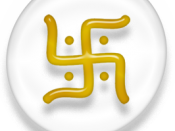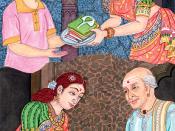In Hinduism the most significant goal in one's life is to reach "Moksha" (Freedom from this world) which allows a person to unite with Brahman-the ultimate reality or force in the universe. In order to achieve this ultimate goal, a follower of humankind's oldest religion must free himself from "Samsara"-the constant cycle of births, deaths, and rebirths (Reincarnations) which devoted followers feel is an essential cycle in their religion.(1)Two goals or "balances of life," if Moksha is to be the ultimate reward, are Dharma-the law that sustains the cosmic order as well as social and individualistic order-and Karma-the deeds and actions or the entire cycle of cause and effects in one's life. The concept of "attachments" in Hindu teachings relates to one's level of involvement and "state of mind" as he or she interacts with the material world--that is, their degree of breaking free from the yearning for unneeded material objects and obtaining worldly possessions.
Attachments are a Hindu's foremost obstacle to gaining Moksha (release from this world) and perpetuate a never-ending bondage for a follower of the faith in the cycles of Samsara.(2)Again, Dharma (Right conduct or behavior) is the Hindu law that sustains the cosmic, social, and individual order and consists of four aspects: Universal Law (rita); Human Law (ashram); Social Law (varana); and Individual Law (svadharma). All of these are combined and referred to as "Sanatana"-the original name of the Hindu religion. Universal Dharma are laws that encompass the natural laws of the universe to include matter and the science of the cosmos. Human Dharma governs "human actions" which sustains the individual within the social and environmental order. Social Dharma is human actions within professional, community, and national responsibilities. Individual Dharma, of course, consists of one's personal or individual responsibilities.(3)The doctrine of Dharma states that proper or...


